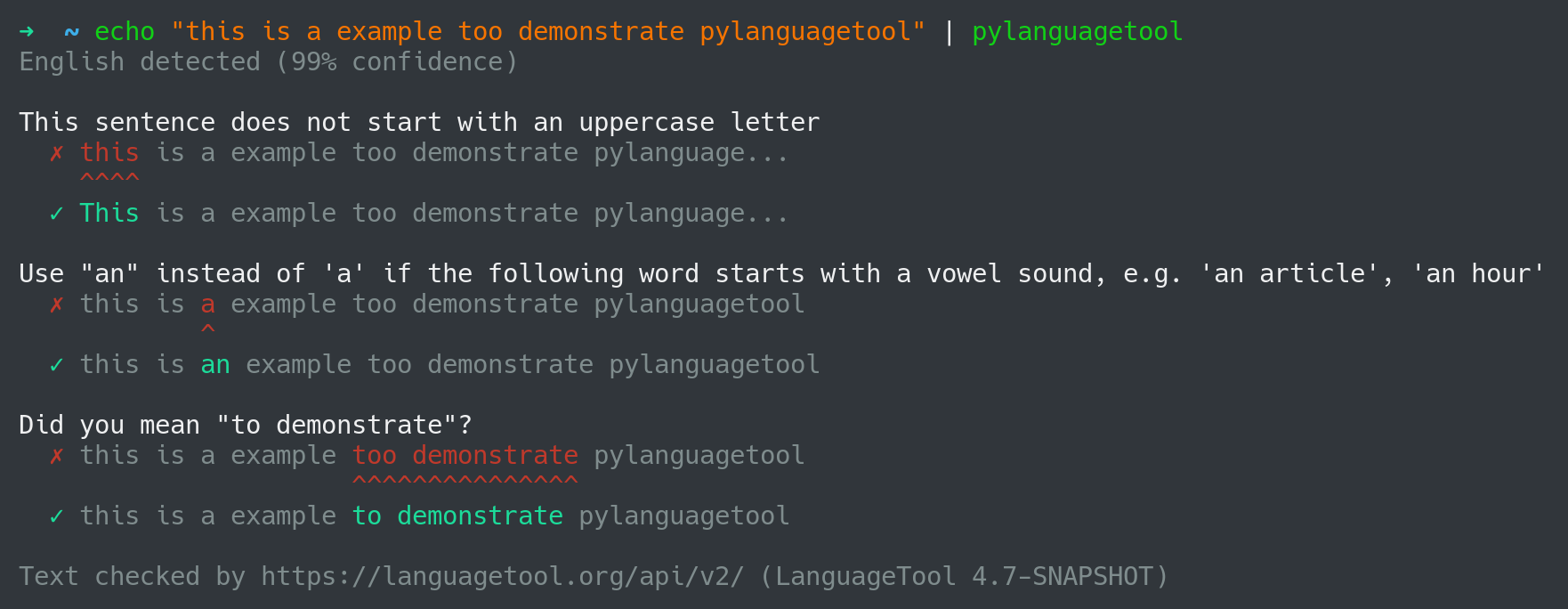A python library and CLI for the LanguageTool JSON API
Project description
A python library and CLI for the LanguageTool JSON API.
LanguageTool is an open source spellchecking platform. It supports a large variety of languages and has advanced grammar support.

Installation
pyLanguagetool can be installed with pip/pipenv:
pip install pylanguagetool
# or via pipenv
pipenv install pylanguagetoolBasic Usage
# pipe text to pylanguagetool
echo "This is a example" | pylanguagetool
# read text from a file
pylanguagetool textfile.txt
# read text from stdin
pylanguagetool < textfile.txt
# read text from the systems clipboard
pylanguagetool -c # get text from system clipboardAll samples above will return a list of detected errors and possible replacements.
# Use "an" instead of 'a' if the following word starts with a vowel sound, e.g. 'an article', 'an hour'
# ✗ This is a example
# ^
# ✓ This is an exampleConfiguration
All LanguageTool API parameters can be set via command line arguments, environment variables or a configuration file (~/.config/pyLanguagetool.conf) For more information about the configuration file syntax, read the ConfigArgParse documentation.
Privacy
By default, pyLanguagetool sends all text via HTTPS to the LanguageTool server (see their privacy policy). You can also set up your own server and use it by changing the --api-url attribute.
Parameters
$ pylanguagetool --help
usage: pylanguagetool [-h] [-V] [-v] [-a API_URL] [--no-color] [-c] [-s]
[-t {txt,html,md,markdown,rst,ipynb,json,xliff}] [-u]
[-r] [--rule-categories] [-l LANG] [-m MOTHER_TONGUE]
[-p PREFERRED_VARIANTS] [-e ENABLED_RULES]
[-d DISABLED_RULES]
[--enabled-categories ENABLED_CATEGORIES]
[--disabled-categories DISABLED_CATEGORIES]
[--enabled-only] [--picky] [-U USERNAME] [-P API_KEY]
[--pwl PWL]
[input files ...]
positional arguments:
input files input file(s)
options:
-h, --help show this help message and exit
-V, --version print version and exit
-v, --verbose verbose output [env var: VERBOSE]
-a, --api-url API_URL
the URL of the v2 languagetool API, should end with
'/v2/' [env var: API_URL]
--no-color don't color output [env var: NO_COLOR]
-c, --clipboard get text from system clipboard [env var: CLIPBOARD]
-s, --single-line check every line on its own [env var: SINGLE_LINE]
-t, --input-type {txt,html,md,markdown,rst,ipynb,json,xliff}
if not plaintext [env var: INPUT_TYPE]
-u, --explain-rule print URLs with more information about rules [env var:
EXPLAIN_RULE]
-r, --rules show the matching rules [env var: RULES]
--rule-categories show the the categories of the matching rules [env
var: RULE_CATEGORIES]
-l, --lang LANG A language code like en or en-US, or auto to guess the
language automatically (see preferredVariants below).
For languages with variants (English, German,
Portuguese) spell checking will only be activated when
you specify the variant, e.g. en-GB instead of just
en. [env var: TEXTLANG]
-m, --mother-tongue MOTHER_TONGUE
A language code of the user's native language,
enabling false friends checks for some language pairs.
[env var: MOTHER__TONGUE]
-p, --preferred-variants PREFERRED_VARIANTS
Comma-separated list of preferred language variants.
The language detector used with language=auto can
detect e.g. English, but it cannot decide whether
British English or American English is used. Thus this
parameter can be used to specify the preferred
variants like en-GB and de-AT. Only available with
language=auto. [env var: PREFERRED_VARIANTS]
-e, --enabled-rules ENABLED_RULES
IDs of rules to be enabled, comma-separated [env var:
ENABLED_RULES]
-d, --disabled-rules DISABLED_RULES
IDs of rules to be disabled, comma-separated [env var:
DISABLED_RULES]
--enabled-categories ENABLED_CATEGORIES
IDs of categories to be enabled, comma-separated [env
var: ENABLED_CATEGORIES]
--disabled-categories DISABLED_CATEGORIES
IDs of categories to be disabled, comma-separated [env
var: DISABLED_CATEGORIES]
--enabled-only enable only the rules and categories whose IDs are
specified with --enabled-rules or --enabled-categories
--picky if enabled, additional rules will be activated
-U, --username USERNAME
For languagetool.org Premium API. Your username/email
as used to log in at languagetool.org [env var:
USERNAME]
-P, --api-key API_KEY
For languagetool.org Premium API. [env var: API_KEY]
--pwl, --personal-word-list PWL
File name of personal dictionary. A private dictionary
can be used to add special words that would otherwise
be marked as spelling errors. [env var:
PERSONAL_WORD_LIST]
Args that start with '--' can also be set in a config file
(~/.config/pyLanguagetool.conf). Config file syntax allows: key=value,
flag=true, stuff=[a,b,c] (for details, see syntax at
https://pypi.org/project/ConfigArgParse/). In general, command-line values
override environment variables which override config file values which
override defaults.Project details
Release history Release notifications | RSS feed
Download files
Download the file for your platform. If you're not sure which to choose, learn more about installing packages.
Source Distribution
Built Distribution
Filter files by name, interpreter, ABI, and platform.
If you're not sure about the file name format, learn more about wheel file names.
Copy a direct link to the current filters
File details
Details for the file pylanguagetool-0.11.0.tar.gz.
File metadata
- Download URL: pylanguagetool-0.11.0.tar.gz
- Upload date:
- Size: 14.0 kB
- Tags: Source
- Uploaded using Trusted Publishing? No
- Uploaded via: poetry/2.1.1 CPython/3.13.2 Linux/6.12.17-amd64
File hashes
| Algorithm | Hash digest | |
|---|---|---|
| SHA256 |
e17cedd7454e0d6c11dab5ee9b1ff5be21cefb4846c3cf6560ad0767d1d1ad38
|
|
| MD5 |
d4ac16ebd272347f13d2742c6b307954
|
|
| BLAKE2b-256 |
189feee81d70fbe3721e76ba4c4a9d66dd721fc29ff95054b9fcaf055fd42749
|
File details
Details for the file pylanguagetool-0.11.0-py3-none-any.whl.
File metadata
- Download URL: pylanguagetool-0.11.0-py3-none-any.whl
- Upload date:
- Size: 13.4 kB
- Tags: Python 3
- Uploaded using Trusted Publishing? No
- Uploaded via: poetry/2.1.1 CPython/3.13.2 Linux/6.12.17-amd64
File hashes
| Algorithm | Hash digest | |
|---|---|---|
| SHA256 |
0b0aa5179e878e63940790731310f06f88314c9ca4d037ab6480c4c1a34acd1a
|
|
| MD5 |
1e4d507a5be29ff53363fb415d5a7f04
|
|
| BLAKE2b-256 |
4fbd0506dad57b4a8f64e8d8071c76da83340a8c74601cfe32cbe9917aeb2dcb
|














